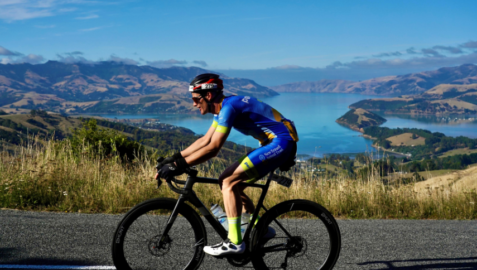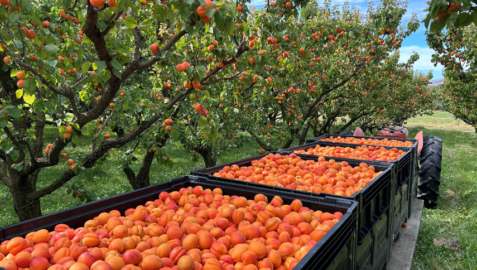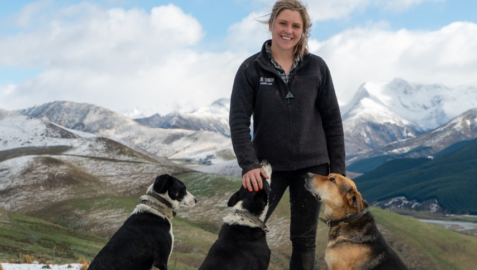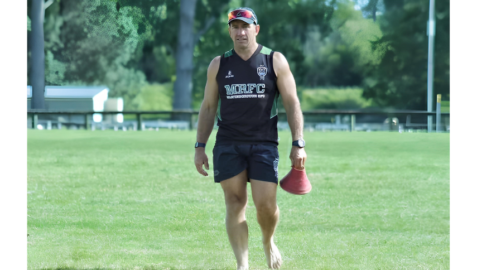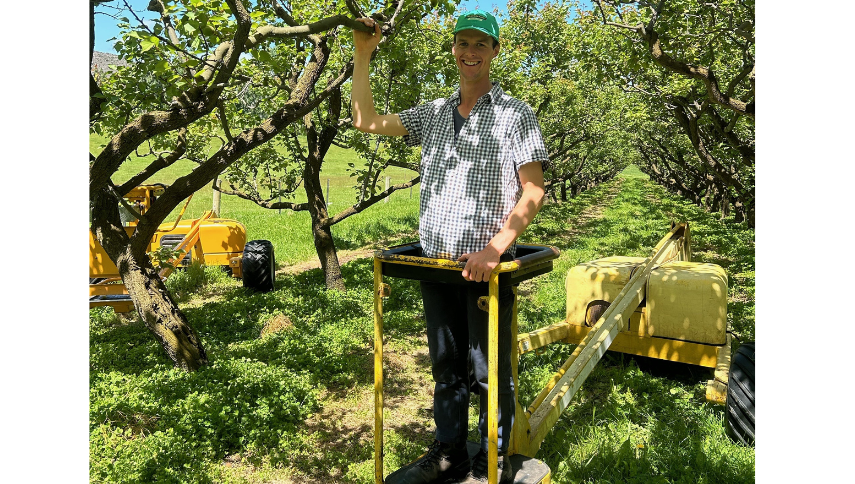
Good to do something different
Module Overview
Roxburgh apricot grower Jack Gilchrist is one of a number of growers and farmers who’ve entered Gravel In Paradise, a series of cycling events in Otago that encourage rural communities to leap on a bike and catch up with friends and neighbours.
Tell us a little about your business Jack.
I grow 10 hectares of stone fruit, mainly apricots but also some cherries, peaches, nectarines and plums. I’ve grown up on the orchard and the family’s been fruit growing here for five generations now. At the moment I’ve got six employees working short term for me as we’re in the midst of apricot thinning, in fruit season that increases to around ten.
How’s the season going?
This season is looking good so far, but still very early days. We had great pollination weather here in the valley during the apricot blossom and I’ve ended up with a good fruit set. Now I’m employing staff to go through and pull the excess fruit off! Plums are looking light, but that is district wide. Overall, I’m happy with how it’s looking.
Last year was a very challenging season. The whole district had a very heavy fruit set, this causes increased labour costs during thinning and it’s often hard to get good fruit size. The heavy supply caused poor local market prices and there were some apricots I had to decide not to pick due to having no markets.
What are the other pressures you face?
The weather’s the biggest one. Our aim is to grow perfect fruit, as this is what the market demands If there’s a storm or frost coming you just have to drop everything – it’s all about saving the crop and looking after the orchard.
During Covid labour was also a big issue, but thankfully that labour shortage has resolved now.
Why have you taken time off to get on the bike and enter Gravel in Paradise?
Fruit growing can be isolating at times, especially when you’re on a smaller scale like me and I’m the only one working during the off season. It is easy to skip things and get bogged down with orchard work, with labour being so expensive, you often end up trying to everything possible yourself. It’s easy to get too busy and to not take time out for yourself. That’s why I try and head out on the bike whenever I can. I’m also part of the local ambulance service, where I volunteer as an Emergency Medical Technician.
What are the benefits of taking breaks like that?
It’s just good to get out and do something different, and to be involved with people outside of your industry. It is my “me” time when I head out on the bike after a day’s work. I take my phone with me when I’m on my bike, but that is only for emergencies like having a mechanical or if someone needs to urgently contact me. So, if it does ring or a text comes in, I look at it and filter whether I really need to answer there and now. Majority of the time these things can wait. With technology we’ve ended up living in a society where we feel like everything needs to be done “now”. Mentally it feels so freeing just getting out and away from work and interruptions.
How do you find time for cycling?
It’s all about planning ahead. In the middle of the fruit season, I’d love to take some time off (to have a so-called ‘summer holiday’) but actually, there just isn’t the time. The reality is it’s a couple of months of constant work. The staff may get some days off if we are up with the picking, but as a grower you’ve got spraying, administration and trying to keep some type of plan in place for the staff as you negotiate the harvest. But one of the benefits I enjoy about being self-employed is that you can manage your own time to a degree. You’ve got your busy times, and you’ve got your quieter times.
What’s your advice to other growers who might be worried about taking time off to enter events like Gravel in Paradise?
You often think to yourself, ‘I can’t go away, I’ve got too much work to do’, but the reality is there is always work to do when you work on the land, and you need to consider if it is really that urgent or if it can wait a couple of days. Take some time out to enjoy yourself. Don’t get so bogged down with work that your own health suffers. The business is no good without you.
What else do you do to manage workload?
I’m a Christian so I try and make sure I have Sundays off and the staff have a day off a week, even in the middle of the fruit season. In the height of the season this isn’t always possible because the fruit can ripen overnight during hot weather, and I haven’t spent a year preparing the fruit for harvest for it to then drop on the ground. Although if I can avoid working on Sunday I will.
I’m also careful to try and make sure I’m only working around eight-ish hours a day. In the fruit season, we often end up working maybe 12-hour days sometimes. But during the winter and quieter times, it’s a matter of telling yourself, ‘actually, I don’t need to do this now. It can wait an extra day.’
One thing farmers have mentioned is managing stress by enjoying the little wins along the way, rather than always focusing on the big goal. What’s your take on that?
You certainly need to have a lot of faith in fruit growing. Sometimes it’s looking like a perfect crop and then the weather turns, and it feels like it’s going to be a disaster. But it’s amazing how it always seems to work out in the end. It feels like that every year to be honest [laughs], but I think that’s just the joys of farming.
What about days when nothing goes right? What do you do to maintain a good headspace?
I find just stopping and having a period of reflection helps. Just take a moment to pause, slow your mind down and think about the best way to work your way through the situation. It’s all about slowing down. Getting wound up just makes everything worse and makes it unpleasant for those around you. Although it can be difficult to slow yourself down when dealing with stress, especially when it’s to do with a decision that’s time critical.
You’re constantly making decisions in growing so maintaining a good headspace is important. In the fruit season you might have days of rain where you can’t pick the fruit, but on the other hand if you’re having hot days and hot nights you can get behind very quickly. Once it’s ripe you’ve only got a day or two to pick it. So, you need to be in the right frame of mind to make these calls.
How do you enjoy life despite these pressures and challenges? Any advice for people starting out?
During those hard patches you just put your head down and plough your way through it. But make sure you make a conscious effort to enjoy the time with your family and get out and spend time doing things you love when you can. The amazing thing about cycling is you’ve got people of all ages and abilities doing it and we’re all we’re able to hop on a bike and race together.
I do a mixture of road racing and gravel racing and last winter I went over to France and actually spent six weeks away cycling the French Alps. I was only meant to be in France for two and a half weeks but while I was over there a spot became available on a cycle tour of the French alps. And I was like, ‘Should I do it? I can’t afford to because I’m behind with my pruning!’ but then I thought well I’m over here and it’s such an amazing opportunity. So, I did it. 2,500 km later and a mere 59,000 m of total elevation, I thought that it was time to return to the orchard.
Yes, I was behind with pruning, but it’s the best trip I’ve ever had and the business didn’t fall over because I was away longer than planned. I was way behind with work, but I managed to catch up again eventually. And isn’t that always the way? So, you can’t let these opportunities go by.
Farmstrong is nationwide, rural wellbeing programme that helps farmers and growers to manage the ups and downs of the industry. Last year more than 15,000 farmers and growers attributed an increase in their wellbeing to the programme. To find out what works for you and lock it in head to www.farmstrong.co.nz
The Gravel in Paradise events for 2025 are 23 Feb Alexandra, 23 March Palmerston, 13 April Middlemarch, 3 May Enfield. You can enter at www.gravelinparadise.co.nz.
